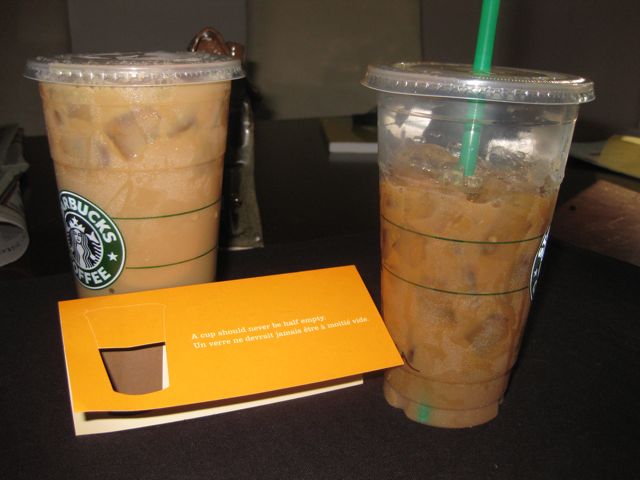The handling a mistake is often more remembered than the mistake itself.
It was a beautiful day yesterday morning…and my first class of the year at University. I’ve taught this class before, but it was still hard to “get into it” when finally the weather seemed summery. I rode my bike to school to enjoy the morning, and home at the end of the day–it was gorgeous. As a treat to celebrate the beauty and accomplishments of the day, I decided to walk to Starbucks and enjoy an iced coffee.
The staff were friendly and joking with each other as one saw if the other could follow her lightening speed order of my drink with all it’s little details with regards to the type of milk, type of syrup, etc. It didn’t seem quite right though when he went back for a second big scoop of ice.

When he handed it to me, I quickly saw that the ice went almost all the way to the bottom. Shucks.
Starbucks is a decadent splurge for me. A treat that I savor and enjoy. And there really wasn’t that much to savor in this cup.
Without even thinking about it, I noted out loud that there was an awful lot of ice in that thar cup. He picked it up and took a look…his colleague agreed that it was heavy on the ice. He contemplated taking some out with a spoon. His colleague suggested that this wasn’t a very sanitary option and had him start again.
He agreed and started making a new one.
As he was working on it, he asked me if I wanted the first beverage–if I didn’t take it, he would just dump it. WOW. A bonus drink is a bonus drink, even if it is half full of ice! So I started drinking the first one as he made the second, with him apologizing for the extra time as he did so. I was so preoccupied with enjoying the first beverage, I hadn’t noticed the time. When he handed me the iced coffee with the appropriate amount of ice, he handed me a piece of paper with a word that he wanted to acknowledge the extra time it had taken to get the drink right.
I left the store and went on my walk with one drink in each hand–feeling almost a little foolish, but a little giddy over the unheard of delight of enjoying two of my favorite drinks! Then I looked at the card he gave me–a free beverage on my next visit as Starbuck’s expression of their desire to serve me well.

When I thought about it later, I realized that by the end of the experience, I was more appreciative of Starbucks than before.
The way they reacted to their mistake actually strengthened my relationship with them! And later on, as I tried to figure out how in the world I might have said something to the barista about the excess ice (usually I have a “life is too short to make a fuss” approach to stuff like this), I remembered that on one previous occasion when I confirmed a detail about my drink, they apologized profusely and remade it. There is a part of me that trusts them to be candid with them.
It got me to thinking about how I tell my students to relax in their conversations with clients–that the research suggests that it is how a mistake is handled that is much more critical than the mistake itself (or, at least, most mistakes that a person makes when they are working ethically and conscientiously).
I realize that Starbucks uses this as a business strategy to build loyalty…but the reason why this is an effective business strategy is because it works! And not only at the business level.
When the error is owned, apologized for, and restitution is made, it enhances the relationship as the respect and commitment towards the other is demonstrated in a tangible and real way.
What I liked about the Starbucks guy is that he made it right with a smile on his face. Even though he knew that he made a mistake, we ended our interaction with smiles…he had tools to make it right (give Starbucks credit for that ) so he didn’t have to feel ashamed, didn’t have to turn it around and blame me for saying something, or glare at me for pointing out a fault. He wasn’t defensive. Further, it enhanced their credibility with me as a place that takes my concerns seriously and doesn’t have me regret being honest–would that I create those relationships in my life where people feel safe enough to tell me when things aren’t going well!
Take positive responsibility for a mistake next chance you get…and see what happens!






Write a Comment